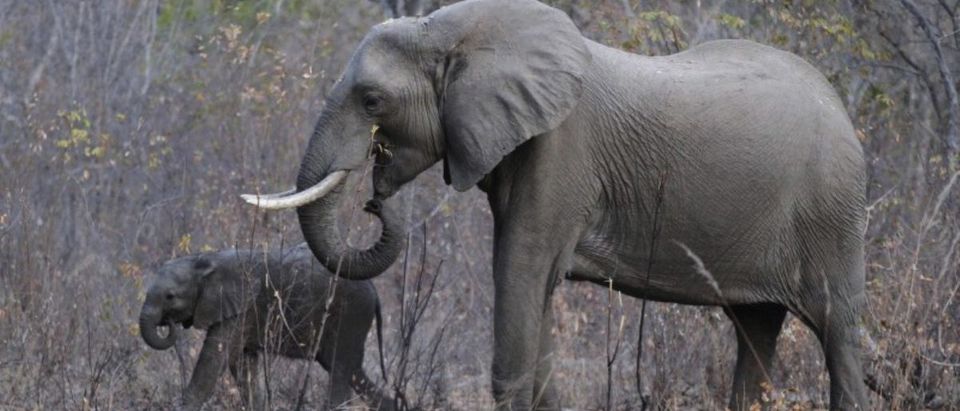A national debate over trophy hunting began last week after the U.S. Fish and Wildlife Service (FWS) announced it would repeal a 2014 ban on importing African elephants killed in trophy hunts.
President Donald Trump soon backed off the decision, saying the ban on importing animals killed in the “horror show” of trophy hunting would be reviewed.
While the ban remains in limbo, debates over the merits and risks of trophy hunting center around a caveat inscribed into law that allows federally protected animals killed in trophy hunts to be imported. The FWS allows such imports “if the import of listed trophy species may … be shown to enhance the species” by being taken through “a well managed and supported conservation hunting program.”
Zimbabwe, one of the countries which the import ban may be lifted from, is promoted as both a corrupt state incapable of supporting successful conservation programs and an example to other African nations of what a successful conservation program looks like.
“Zimbabwe is one of the most corrupt countries in the world and there have been many examples of the government’s inability to properly manage their wildlife, especially when it comes to trophy hunting,” Humane Society International wildlife program manager Iris Ho told The Daily Caller News Foundation.
“Trophy hunting actually breeds corruption,” Ho added.
While agreeing that Zimbabwe’s government is filled with “gangsters,” Tim Rupli, a former FWS official under former President George H. W. Bush, has seen first-hand how American trophy hunters fund conservation in the Africa.
“These governments, they don’t protect the elephants. They can’t because the top guy steals all the money, right?” Rupli, also a former officer of the Southern Africa Wildlife Trust which leads anti-poaching efforts in Sub-Saharan Africa, told TheDCNF. “The real money is from tourists, which is some, and the hunting, which is a lot.”
African elephants are threatened mainly by habitat loss and poaching. As human populations expand in Africa, more habitat is converted to farms and development. People kill animals such as lions and elephants that threaten the expanding communities.
Ivory from elephants is popular in Asia and fetches around $1,500 a pound. Poachers killed about 100,000 elephants in Africa from 2012 to 2014 for the ivory trade. Currently, Africa’s wild elephant population is around 415,000.
Elephant trophy imports into the U.S. should be banned from all African countries because elephants, unlike people, do not recognize national boundaries and migrate throughout their habitat, Ho says. Protecting spot populations is not enough.
“A lot of these trophy hunters, they go all the way to Africa, and it’s really just for the trophies, for their bragging rights,” Ho told TheDCNF. “If we can stop the importation, then, you know, at least the United States would not be participating in exacerbating the populations decline [of African Elephants].”
Rupli says stopping American trophy hunters from importing their prizes decimates a relatively low impact industry that pays massive dividends toward conservation and GDP per hunter. While the tourism industry pays well, the volume of tourists negatively impacts wild animals not conditioned to seeing crowds of people and vehicles. Tourism also can’t approximate the per capita volume of money trophy hunting brings in.
“How long do you think a pregnant cow elephant is going to stay pregnant when a bunch of guides are chasing her around in a range rover, right?” Rupli told TheDCNF. “Multiply that by the thousands and thousands of people that come from Europe and America on vacation. They don’t spend a tenth of the money that a hunter does, and there’s more of them.”
When allowed to keep the head of their kill, U.S. trophy hunters pay anywhere from $50,000 to $150,000 per elephant, depending on the size. Hunters also shell out money for guides and trackers and pay for equipment, shelter and food, according to Rupli.
Zimbabwe’s economy, lacking a currency of its own, runs on foreign money mainly from U.S. trophy hunters. Hunting injects large amounts of cash directly into communities responsible for elephant conservation. Profits from trophy huntering incentivizes cash-strapped African communities to protect large herds of elephants in order to eventually raise the huge trophies that hunters want to bag.
“It’s about the dollars,” Rupli said. “I happen to love hunting, but if I hated it and I loved elephants, I would grudgingly say ‘Alright, let’s let a few rich assholes from America kill the oldest elephants that have the biggest ivory.'”
All content created by the Daily Caller News Foundation, an independent and nonpartisan newswire service, is available without charge to any legitimate news publisher that can provide a large audience. All republished articles must include our logo, our reporter’s byline and their DCNF affiliation. For any questions about our guidelines or partnering with us, please contact licensing@dailycallernewsfoundation.org.


